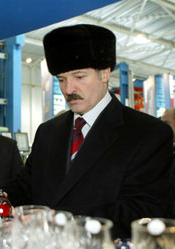 Comments posted on Lukashenko's website said: "There is no time for a warm-up," and that he had "noted the nesessity of making construction of nuclear power plants more active." Lukashenko's plans could see a power reactor start up in the country in 2012, with a second following in 2015. Estimates of the cost of such a project reach $3 billion.
Comments posted on Lukashenko's website said: "There is no time for a warm-up," and that he had "noted the nesessity of making construction of nuclear power plants more active." Lukashenko's plans could see a power reactor start up in the country in 2012, with a second following in 2015. Estimates of the cost of such a project reach $3 billion.Belarus was the country worst affected by the Chernobyl disaster of 26 April 1986, when a power runaway accident destroyed the plant's fourth RBMK reactor unit. The wind carried radioactive material released from the reactor in neighbouring Ukraine over Belarus where a large portion of it fell to the ground. A survey immediately after the accident recommended 130,000 sq. km of land be withdrawn from agricultural use.
At the time of the accident, Belarusian officials cancelled a planned nuclear programme, but now, mentioning "national safety and integrity," Lukashenko is considering nuclear energy for the country.
The move is seen as a reaction to the energy crisis Belarus faced in the first days of 2007 following a dispute over oil supplies. The former Soviet state relies on Russia for a large part of its oil and gas consumption and Russia has long provided the resources at favourable prices, effectively subsidising the country to the tune of $6 billion per year. At the end of 2006, Russia changed the deal, upping the price of gas from $47 to $105 per thousand cubic metres and imposing a duty of $180 on each tonne of oil.
The changes, which increased Belarus' fuel bill by $3.5 billion, provoked angry responses from Minsk. Lukashenko imposed a transit fee of $45 on each tonne of Russian oil piped across Belarus and even began tapping oil from the pipelines as payment. The Russian response to was to cut off the Druhza pipeline, affecting oil supply to the whole of Europe.
However, it is unclear how Belarus might practically employ nuclear energy to reduce imported fossil fuel consumption.
Belarus is a state-capitalist economy, with foreign ownership of companies at only 4%. It was not ranked in the World Economic Forum's 2004-2005 Global Competitiveness Report, Lukashenko himself has faced challenges and sanctions from the European Union over the legality of his 2006 election victory, and it is highly unlikely that officials would leverage Russian contacts for assistance with a nuclear power programme.
Further information
Alexander Lukashenko's Presidential website
World Economic Forum
WNA's Chernobyl Accident information paper






_15863.jpg)







